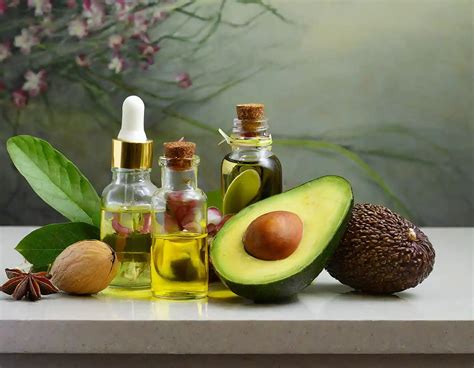Introduction
Carrier oils play a crucial role in aromatherapy, skincare, and hair care routines. They serve as a base for essential oils, aiding in their absorption and dilution for safe application on the skin. In this article, we will delve into the world of carrier oils, exploring their benefits, applications, and properties.

Understanding Carrier Oils
Carrier oils, also known as base oils or vegetable oils, are natural oils extracted from plants. They are non-volatile, meaning they do not evaporate quickly at room temperature. Carrier oils are rich in fatty acids, vitamins, and minerals, making them nourishing for the skin and hair.
Types of Carrier Oils
There is a vast variety of carrier oils available, each with unique properties and benefits. Some of the most popular carrier oils include:
- Jojoba oil: Known as “liquid gold,” this oil is chemically similar to the sebum produced by our skin. It is highly moisturizing and helps regulate sebum production.
- Coconut oil: This tropical oil is rich in lauric acid, which has antibacterial and antifungal properties. It is also highly moisturizing and protective.
- Argan oil: Often referred to as “liquid gold,” this oil is rich in antioxidants and essential fatty acids. It helps protect the skin from damage and promotes hair growth.
- Avocado oil: This nutrient-rich oil is high in vitamins A, D, and E. It is deeply moisturizing and helps soothe inflammatory skin conditions.
Table 1: Common Carrier Oils and Their Properties
| Carrier Oil | Key Properties |
|---|---|
| Jojoba oil | Non-comedogenic, regulates sebum production |
| Coconut oil | Antibacterial, antifungal, moisturizing |
| Argan oil | Antioxidant, anti-inflammatory |
| Avocado oil | Moisturizing, anti-inflammatory |
| Almond oil | Rich in vitamin E, hypoallergenic |
| Grapeseed oil | Lightweight, non-comedogenic |
| Olive oil | Rich in antioxidants, moisturizing |
Benefits of Carrier Oils
Carrier oils offer a wide range of benefits for the skin, hair, and overall well-being:
- Moisturizing: Carrier oils help keep the skin and hair hydrated by forming a protective barrier that prevents moisture loss.
- Anti-inflammatory: Some carrier oils, such as argan oil and avocado oil, have anti-inflammatory properties that can soothe and reduce skin irritation.
- Antioxidant: Carrier oils rich in antioxidants, such as vitamin E, protect the skin and hair from damage caused by free radicals.
- Soothing: Carrier oils have calming effects that can help soothe and relax tense muscles.
- Promoting hair growth: Certain carrier oils, such as rosemary oil and castor oil, are known to stimulate hair growth and improve hair quality.
Applications of Carrier Oils
Carrier oils are used in a variety of applications, including:
- Aromatherapy: Carrier oils are used as a base for essential oils in aromatherapy diffusers and massage blends.
- Skincare: Carrier oils are used as a moisturizer, cleanser, and makeup remover. They are also added to skincare products, such as lotions, creams, and serums.
- Hair care: Carrier oils are used as a hair moisturizer, conditioner, and scalp treatment. They can be applied to hair on its own or as part of a hair mask.
- Massage: Carrier oils are used as a base for massage oils, providing lubrication and relaxation benefits.
- Cosmetic applications: Carrier oils are used in various cosmetic products, including lipsticks, lip balms, and body butters.
Table 2: Applications of Carrier Oils in Different Products
| Product Category | Carrier Oils Used |
|---|---|
| Aromatherapy | Jojoba oil, coconut oil, argan oil |
| Skincare | Jojoba oil, coconut oil, avocado oil, almond oil |
| Hair care | Coconut oil, argan oil, grapeseed oil, castor oil |
| Massage | Jojoba oil, coconut oil, almond oil |
| Cosmetics | Jojoba oil, coconut oil, argan oil |
Selecting the Right Carrier Oil
Choosing the right carrier oil depends on your skin type, hair type, and desired benefits. Here are some tips for selecting the best carrier oil for your needs:
- For oily or acne-prone skin: Opt for carrier oils that are non-comedogenic, such as jojoba oil or grapeseed oil.
- For dry or sensitive skin: Choose carrier oils that are rich in moisturizing and anti-inflammatory properties, such as coconut oil or avocado oil.
- For hair growth: Consider carrier oils that are known to promote hair growth, such as rosemary oil or castor oil.
- For aromatherapy: Select carrier oils that are compatible with the essential oils you intend to use.
Table 3: Carrier Oil Selection Guide
| Skin Type | Hair Type | Desired Benefits | Suggested Carrier Oils |
|---|---|---|---|
| Oily/acne-prone | All hair types | Moisturizing, anti-inflammatory | Jojoba oil, grapeseed oil |
| Dry/sensitive | Dry/damaged hair | Moisturizing, conditioning | Coconut oil, avocado oil |
| All skin types | All hair types | Hair growth | Rosemary oil, castor oil |
| All skin types | All hair types | Calming, relaxing | Lavender oil, chamomile oil |
Common Mistakes to Avoid When Using Carrier Oils
- Using undiluted carrier oils: Carrier oils should always be diluted with essential oils before applying them to the skin. Undiluted essential oils can be irritating to the skin.
- Applying carrier oils to broken or irritated skin: Avoid applying carrier oils to open wounds or skin that is already irritated. Carrier oils can further irritate damaged skin.
- Using expired carrier oils: Over time, carrier oils can become rancid. Using expired carrier oils can cause skin irritation or allergic reactions.
- Storing carrier oils improperly: Carrier oils should be stored in a cool, dark place. Heat and light can break down carrier oils and reduce their shelf life.
Pros and Cons of Using Carrier Oils
Pros:
- Carrier oils are natural and gentle on the skin.
- They are rich in nutrients and beneficial compounds.
- They can be used for a variety of applications.
- They are relatively inexpensive.
Cons:
- Some carrier oils can be comedogenic for certain skin types.
- Carrier oils can become rancid over time if not stored properly.
- Some carrier oils have a strong odor that can be unpleasant for some people.
Table 4: Pros and Cons of Using Carrier Oils
| Pros | Cons |
|---|---|
| Natural and gentle | Can be comedogenic for certain skin types |
| Rich in nutrients | Can become rancid over time |
| Versatile applications | Some carrier oils have a strong odor |
| Inexpensive |
Creative Ways to Use Carrier Oils
In addition to the traditional uses of carrier oils, there are many creative ways to incorporate them into your daily routine. Here are a few ideas:
- Create your own massage oil blends: Combine carrier oils with essential oils to create custom massage oil blends for relaxation, pain relief, or energy.
- Make a DIY hair mask: Mix carrier oils with natural ingredients, such as avocado, honey, or yogurt, to create a nourishing hair mask.
- Use carrier oils as a makeup remover: Carrier oils, such as jojoba oil or coconut oil, can gently remove makeup without irritating the skin.
- Add carrier oils to your bathwater: Add a few drops of carrier oil to your bathwater to create a relaxing and moisturizing bath.
Conclusion
Carrier oils are versatile and beneficial ingredients that can enhance your skincare, hair care, and overall well-being. By understanding the different types of carrier oils, their benefits, and applications, you can make informed choices about which carrier oils are right for your needs. So, embrace the world of carrier oils and discover the myriad of ways they can enrich your life.
